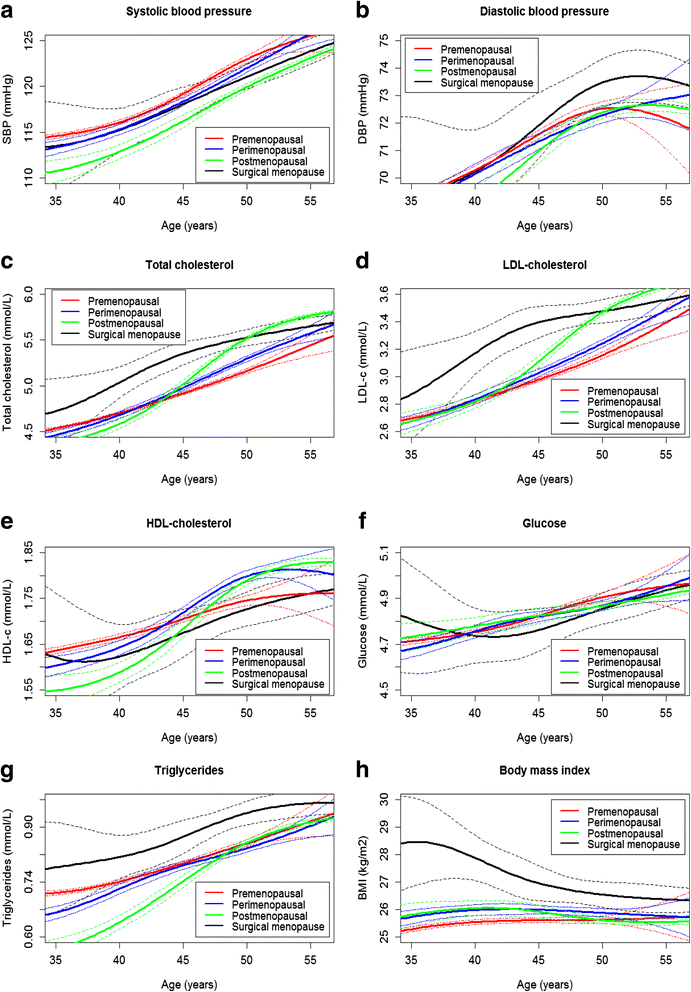Unraveling the associations of age and menopause with cardiovascular risk factors in a large population-based study
- PMID: 28049531
- PMCID: PMC5210309
- DOI: 10.1186/s12916-016-0762-8
Unraveling the associations of age and menopause with cardiovascular risk factors in a large population-based study
Erratum in
-
Erratum to: Unraveling the associations of age and menopause with cardiovascular risk factors in a large population-based study.BMC Med. 2017 Mar 29;15(1):74. doi: 10.1186/s12916-017-0841-5. BMC Med. 2017. PMID: 28356103 Free PMC article. No abstract available.
Abstract
Background: Although the association between menopause and cardiovascular disease (CVD) risk has been studied extensively, the simultaneous role of chronological aging herein remains underexposed. This study aims to disentangle the relationships of menopausal status and chronological aging with CVD risk factors in the largest study population to date.
Methods: In this cross-sectional study, CVD risk factors were compared between women with a different menopausal status within the same yearly age strata. The study population comprised female participants of the baseline visit of the population-based LifeLines Cohort Study. A total of 63,466 women, aged between 18 and 65 years, was included. Of them, 39,379 women were considered to be premenopausal, 8669 were perimenopausal, 14,514 were naturally postmenopausal, and 904 were surgically postmenopausal.
Results: Compared to postmenopausal women aged 45 years, average total cholesterol (TC) and low-density lipoprotein cholesterol (LDL-c) were 0.5 and 0.4 mmol/L higher, respectively, in postmenopausal women aged 50. Systolic and diastolic blood pressure levels were 4 and 1 mmHg higher, respectively. At all ages between 46 and 55 years, and after adjustment for confounders, naturally postmenopausal women had 0.2 to 0.4 mmol/L higher TC and 0.1 to 0.3 mmol/L higher LDL-c levels compared to premenopausal women in the same age range. Systolic blood pressure levels were up to 4 mmHg lower in naturally post- compared to premenopausal women at all ages between 29 and 52 years. Body mass index levels were up to 3.2 kg/m2 higher in women with surgical menopause compared to all other women between the ages 32 and 52 years. All aforementioned results were statistically significant.
Conclusions: Chronological age and menopausal status are both independently associated with CVD risk factors. Based on the comparatively smaller observed differences associated with menopausal status than with chronological aging, the significance of a more unfavorable lipid profile in a later reproductive stage may be less obvious than previously thought.
Keywords: Cardiovascular risk; Female aging; Menopause.
Figures

Similar articles
-
Menopause with cardiovascular disease and its risk factors among rural Chinese women in Beijing: a population-based study.Maturitas. 2012 Jun;72(2):132-8. doi: 10.1016/j.maturitas.2012.02.013. Epub 2012 Mar 22. Maturitas. 2012. PMID: 22445219
-
Natural menopause and cardiovascular disease risk factors. The Poland and US Collaborative Study on Cardiovascular Disease Epidemiology.Ann Epidemiol. 1994 Nov;4(6):445-8. doi: 10.1016/1047-2797(94)90003-5. Ann Epidemiol. 1994. PMID: 7804498
-
[Study on risk factors of cardiovascular disease and the status of bone mineral density in women with hypoestrogenism].Zhonghua Fu Chan Ke Za Zhi. 2013 Oct;48(10):734-9. Zhonghua Fu Chan Ke Za Zhi. 2013. PMID: 24406128 Chinese.
-
Lipid profile differences during menopause: a review with meta-analysis.Menopause. 2019 Nov;26(11):1327-1333. doi: 10.1097/GME.0000000000001403. Menopause. 2019. PMID: 31567869 Review.
-
Influence of aging and menopause on lipids and lipoproteins in women.Angiology. 2008 Apr-May;59(2 Suppl):54S-7S. doi: 10.1177/0003319708319645. Epub 2008 May 29. Angiology. 2008. PMID: 18515273 Review.
Cited by
-
Does reproductive stage impact cardiovascular disease risk factors? Results from a population-based cohort in Lausanne (CoLaus study).Clin Endocrinol (Oxf). 2022 Nov;97(5):568-580. doi: 10.1111/cen.14730. Epub 2022 Apr 15. Clin Endocrinol (Oxf). 2022. PMID: 35377481 Free PMC article.
-
Estrogen Receptor and Vascular Aging.Front Aging. 2021 Sep 24;2:727380. doi: 10.3389/fragi.2021.727380. eCollection 2021. Front Aging. 2021. PMID: 35821994 Free PMC article. Review.
-
The evolutionary ecology of age at natural menopause: implications for public health.Evol Hum Sci. 2020 Nov 13;2:e57. doi: 10.1017/ehs.2020.59. eCollection 2020. Evol Hum Sci. 2020. PMID: 34796315 Free PMC article.
-
Cardiovascular Disease in Women: Does Menopause Matter?Curr Opin Endocr Metab Res. 2022 Dec;27:100419. doi: 10.1016/j.coemr.2022.100419. Epub 2022 Oct 6. Curr Opin Endocr Metab Res. 2022. PMID: 37274015 Free PMC article.
-
Experience with ospemifene in a patient with vulvovaginal atrophy and dyslipidemia: a case study.Drugs Context. 2020 Jul 1;9:2020-3-5. doi: 10.7573/dic.2020-3-5. eCollection 2020. Drugs Context. 2020. PMID: 32670379 Free PMC article.
References
-
- El Khoudary SR, Santoro N, Chen HY, Tepper PG, Brooks MM, Thurston RC, et al. Trajectories of estradiol and follicle-stimulating hormone over the menopause transition and early markers of atherosclerosis after menopause. Eur J Prev Cardiol. 2016;23(7):694–703. doi: 10.1177/2047487315607044. - DOI - PMC - PubMed
MeSH terms
Substances
LinkOut - more resources
Full Text Sources
Other Literature Sources
Medical

